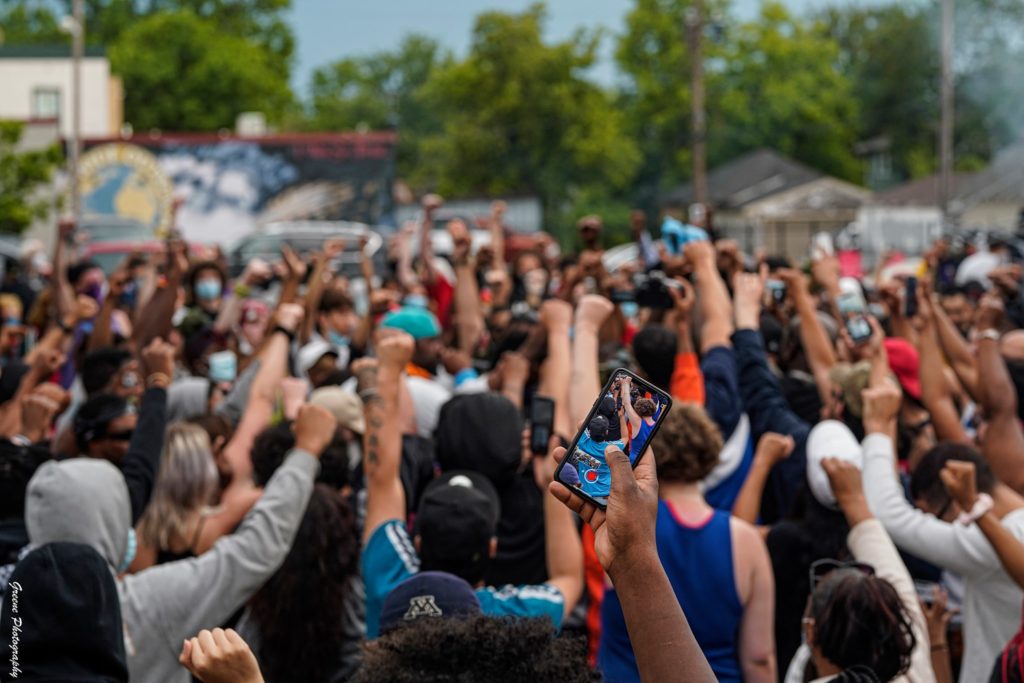The protests following the police murder of George Floyd in Minneapolis, Minnesota on May 25th have spread across the country and around the world. Multiple factors led to this flashpoint moment, and participants in the Black Lives Matter movement continue to push for racial and social equality.
Like the Civil Rights movements of the past, the struggle for racial equality does not exist without people, and people fighting for social justice can only march so many miles on faith, unity and inner strength.
Every member of a community contributes to the greater whole, and the Minneapolis protests for Black justice are no different. Behind the protest lines, courageous neighbors are volunteering to fight in unique ways –every single day– to make the community stronger and more whole than ever before. We spoke with ingenuous, hard-working supporters who have been deeply involved with the efforts.
Minnesota-based photographer Nedahness Greene noted that aside from the locally-born citizens, their neighbors come from all over the country. Transplanted residents hail from such diverse locales such as St. Louis, Chicago, Houston, Texas; even California. Some arrive in hopes of a better environment or standard of living.
Quite a few of those who are participating in protests are originally from the deep South in the US, and have chafed against the yokes of unjust systems since birth. Noble Ayoka has been involved since news began to spread of Floyd’s killing by police. Ayoka is Mississippi-born. Since the uprising began, he has protested and worked with different on-the-spot organized food drives and assistance groups from nine in the morning until two the following morning on a daily basis. His motivation is simple.

“This is something I have got to do. I don’t look at it as a job or anything,” said Ayoka by phone this week. “My energy has me needing to do this. I’m seeing a lot of contributions to the community as far as everyone helping and donating –helping the community grow.” Efforts are not sponsored by corporations or foundations. These are individuals making personal sacrifices to show up for what they believe.
While Ayoka was assisting with security, his own family came out to grill and serve food to the community at 38th and Chicago – the center point where protests converge and Minneapolis residents have gathered for sustenance, business vending and bolstering one another. He was encouraged to see people he’d known for years come out to assist him in helping others. They all worked together at the grill and urged people to vote while dishing up plates of Asian-influenced short ribs, racks of ribs, beef stick skewers, chicken fried rice, egg rolls and hot dogs.
Food drives took place to nourish the movement as well as the community at large. One such effort is run by Veronica Sallis of Making Minnesota Right, which serves the Central neighborhood and George Floyd Memorial area in Minneapolis. Sallis has her own business running a cleaning enterprise that has taken a back seat to the community effort right now.
“We donate household essentials, baby items, and food completely free of charge to the community within a ten-mile radius. We’re set up at 38th and Chicago at the Speedway location. We’ve been doing this every day since the passing of George Floyd,” said Sallis. “Volunteers actually have gone to pick things up. People can bring household items and toiletries, everything to make it through this time. We’ve even distributed fire extinguishers! If we don’t have it, we get it!”
Sallis posts needs on her Facebook donation page and also organizes hot food efforts daily. Whoever presents themselves as able to help contributes time, food or work, and they cook everything from chicken, steak and ribs to brats, burgers and hot dogs. Everything is fresh and cooked hot to serve those in need who show up. They coordinate with volunteers, vendors and master grillers from the community that donate work time as well.
“There’s no limit. Nothing’s too big or too small. Because it’s like we’re family at this point and time. That’s our main focus. We want everybody to get something. We know everyone wants to partake in something. That’s why we have people come in and volunteer,” she explained by phone. We spoke briefly as she headed over to work at the site for the day. “We receive donations on the site as well. Whatever they need, we provide it for them. We have a lot of vendors we work with also. Last week, we had tacos; and everything is free.”
Sallis uses her own funds and any contributions they receive are put to use for the effort. They also accept fresh food donations for cooking or distribution. There is only so much they can do, but people look forward to it every day. She says she feels thankful. “People really rely on us, depend on us,” said allis. “It is so amazing. It’s such a good feeling to come home at night and just feel forever grateful.”
Noble Ayoka wanted the protestors they fed to also understand the importance of education within the government system –not just for voting, but grasping the activity of the movement and what their rights are as well. Giving of themselves in this way demands sacrifice, but the rewards of grassroots growth include a flourishing community.
Few food drives are sponsored by larger organizations or businesses. They have been almost entirely sustained by groups of folks who come together with the sole purpose of forming a band of strength and support. “The people we knew spread the word on Instagram and social platforms,” said Ayoka. “We called around to see who could come and help and benefit the community.”

There is a harmonious flow around these projects, but the last weeks have not been without tension. “At the same time, it’s bringing forward a lot of peoples’ true colors. This is showing to the world that for all of these years we’ve been working and trying to bring respect, there are still those that don’t have even an inkling of care for their own communities,” said Ayoka. “And these are people they may be our neighbors; they may be people we work with. Maybe they’re individuals that are quick to smile in our faces, but don’t care. It’s sad, but at the same time it’s good to know now, when things are serious, who really cares and who doesn’t.”
Another participant who declined to be named was compelled to show up at the protests out of deep concern. “I’m a Black man who has been a victim of consistent harassment, profiling and other trauma. I’ve also had an encounter with the murderer of Mr. Floyd,” he said. “Besides that, I’m from the neighborhood where Mr. Floyd was murdered. I participated in all events.”
But the miasma of apathy does not just sit on congealed platters across color lines. Even family members and friends in affected communities may sit in recliners with a remote at hand and show little emotional support or concern for the struggles of justice against racism, police brutality, and social ills.
“I guess they’re comfortable or they think they are not affected yet, and it’s sad to see that,” he said. “So, I don’t know. I would like to see people truly unify without other motivations.”
“Like religion. I know that’s a very loaded answer, but it would be nice to see more people come together and not say that it’s because of a religious-based belief… That’s when things will truly start changing,” he said.
His hopes are that the multi-level community change and relief efforts will continue to be non-denominational (not relegated to a particular church or faith-based programs). Addressing the underlying needs of the people must cross the boundaries of belief systems and government intervention to generate long-term, sustainable change on all levels.
“I hope this isn’t one of those types of things where people unify for a couple of months or weeks because they were sacred, but actually opened their eyes and realized this is something that needs to be addressed on all levels, all of the time,” said Ayoka. “This isn’t just a weekend or two-week event.”
Real change requires exposing the framework of systemic racism. Protesters want people to realize that racism exists on every cornerstone the country was built on. As we spoke, Ayoka considered the roots of race in America.
“This is stolen land; this isn’t our land. We are all immigrants here except for Native Americans and that needs to be addressed at this time, too. Children need to be educated on what is truly happening in the world,” he said.
School systems traditionally endow less-melanated figures in history with a cloak of heroism, obfuscating the stories, struggles and contributions of people of color, or ignoring them altogether. Since the protests started, a Minneapolis monument to Christopher Columbus has been pulled down.
“They need to teach kids what truly happened – how they started villainizing Black people and all we have done and fought for – and change the curriculums completely,” said Ayoka. “Jobs cannot discriminate – paying one person one wage and not paying the same to others because of the color of their skin, or their background, or credit score or anything like that.”
“There has to be equality, and that is what I’m pushing for –not just protesting the arrests and killings of these innocent people,” he said. “I want equality across the board. That’s what I’m doing this for, and I’m not going to do stop doing this until that goal is met.”
Noble Ayoka continues to show up daily to the protests, food drives and fill other roles in whatever way he’s needed. As we closed our conversation, his words were, “Absolutely. Any way I can help.”
This attitude of willingness to see things through is reflected by Veronica Sallis and other mutual aid and food projects as well. The shockwaves that have reverberated through this community –and across the country– have created new daily priorities for countless residents which will take precedence indefinitely.
The turnout has been amazing for both protests and community efforts, which are still happening. Grassroots efforts are continuing daily. The people of Minneapolis are creating joy from the ruins of an antiquated system while they demand justice.
Those I spoke with repeatedly expressed how much they appreciate people truly standing up and contributing from the heart. They have a renewed sense of purpose and a determined resilience.
“I’ve been out here walking for miles, driving from place to place to look at affected spots across the city,” said Ayoka. “I’ve seen kids from as young as two years old walking around with a protesting sign all the way up to elders – some who can’t even walk. Everyone is out here participating and they are doing it from the heart. It’s heart-driven.”
The sentiment on protest lines, in the neighborhoods, and across community organizations is that people want change and they want it understood that all are human. This is a human problem.
May change come to all those who seek it.
Author Bio:
